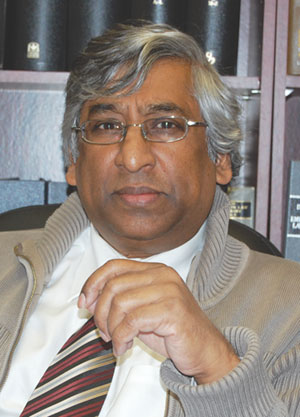
A Toronto lawyer has lodged a formal complaint against a justice of the peace who accused him of “sharp practice” before convicting him of a speeding offence.
 Michael Jagtoo of Jagtoo & Jagtoo Professional Corp. had his conviction overturned after a judge found he hadn’t received adequate disclosure and that Justice of the Peace Robert Boychyn appeared biased against him.
Michael Jagtoo of Jagtoo & Jagtoo Professional Corp. had his conviction overturned after a judge found he hadn’t received adequate disclosure and that Justice of the Peace Robert Boychyn appeared biased against him.
But Jagtoo was so upset by the treatment he received at trial that he has now made a complaint to the Justices of the Peace Review Council.
Council registrar Marilyn King says she “cannot confirm or deny whether a complaint has been received” and that any investigations take place in private. Boychyn, a former lawyer and Oshawa, Ont., regional councillor, couldn’t be reached for comment. He became a justice of the peace in 2003.
Jagtoo’s father James represented him in his appeal. “We had no choice but to do something about the situation,” the elder Jagtoo tells Law Times. “To my thinking, [Boychyn] came to conclusions that were totally without factual or evidentiary foundation and in fact defamed Michael.
If it had not been in a court where he enjoyed immunity, that might have attracted a defamation lawsuit. It doesn’t get any worse for a lawyer than an accusation of sharp practice.”
Read more: The typical cost of a defamation lawsuit in Canada
His son’s trial took place on Sept. 29, 2009, after authorities pulled him over for speeding in Durham Region in April of that year. Five days before the trial, he asked for disclosure, but the request went to the wrong office.
As a result, prosecutor Jane Moffatt received it on the day before the trial. That meant she couldn’t process the request but instead delivered a verbal summary to the accused on the day of the trial. He requested an adjournment, noting he also intended to retain counsel specializing in Highway Traffic Act offences.
In his ruling on the appeal, Justice Robert Beninger of the Ontario Court of Justice said the younger Jagtoo had shown a “lack of due diligence” in making his request so close to the trial date but he found Moffatt’s disclosure insufficient.
Boychyn was much harsher in his assessment of the lawyer’s actions as he dismissed his request for an adjournment.
“I’m absolutely shocked and amazed that a barrister and solicitor, in good standing, in this province, would treat these matters in such a cavalier fashion. . . . I find your request to have this matter adjourned disingenuous and smacking of, what has been referred to as, sharp practice,”
Boychyn said, according to a transcript of the proceedings. “I’m disappointed in your request and I think it’s an embarrassment to and an insult to the court and to the profession of barristers and solicitors and your motion is declined.”
The trial then proceeded with the younger Jagtoo representing himself. Boychyn found him guilty of speeding and fined him $259. “It seems he felt that because Michael was a lawyer, that somehow he should be able to soldier through,” his father says. “That’s where there was a differential standard applied to him.”
Boychyn opened the reasons for his decision by noting the accused was a lawyer and outlining the circumstances of the request. A reasonable observer, according to Beninger, would conclude Boychyn “was predisposed to decide the case” against the accused.
“A lawyer who is a defendant before the court should not be treated any differently, and should not appear to be treated any differently, than any other defendant before the court,” Beninger wrote.
Beninger said that if inadequate disclosure had been the only issue, he would have ordered a new trial.
But in light of his findings about the appearance of bias, he instead entered an acquittal.
“This trial was a sham,” the elder Jagtoo says. “It was a charade. It was a matter of just minutes before he got to the comments about sharp practice, for which there was absolutely no evidence. That’s not something you lightly accuse another lawyer of.”
He tells Law Times he feels other rulings by Boychyn “give me pause that he does not have a judicial temperament.”
“This is not an isolated instance in which he has departed, in my view, from the principled decision-making,” he says, pointing to the case of Damian Persaud, a 19-year-old who pleaded guilty in January 2008 to careless driving and racing.
According to an Ontario Court of Justice ruling, Boychyn ignored a joint submission of a $2,265 fine and a one-year driving suspension and instead doubled Persaud’s suspension and sentenced him to six days in jail for the racing offence.
In 2009, Justice Joseph De Filippis reduced the fine to $465 and found Boychyn had erred in rejecting the joint submission without warning counsel that he intended to do so and by failing to explain why their sentencing proposal would bring the administration of justice into disrepute.
According to a transcript of the sentencing, Persaud’s lawyer told the court the punishment was a “far jump” from the joint submission.
“Well, it’s only a very short period of time, and I’ve made my order, so officer, would you escort this young man to his new residence, please,” Boychyn responded.
“That language, in my view, is not judicial language,” the elder Jagtoo tells Law Times. “It’s almost cavalier and about something so serious as depriving someone of their liberty. In this instance, I see no evidence of judicial temperament.”